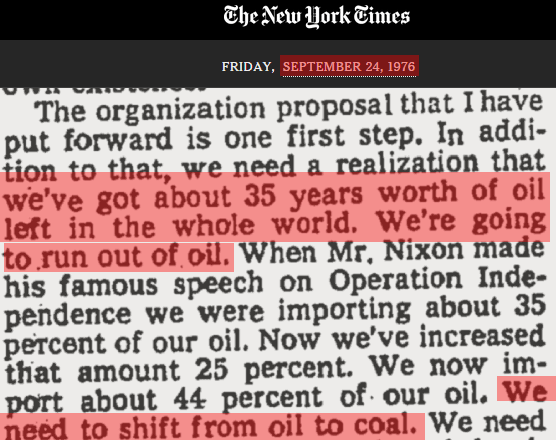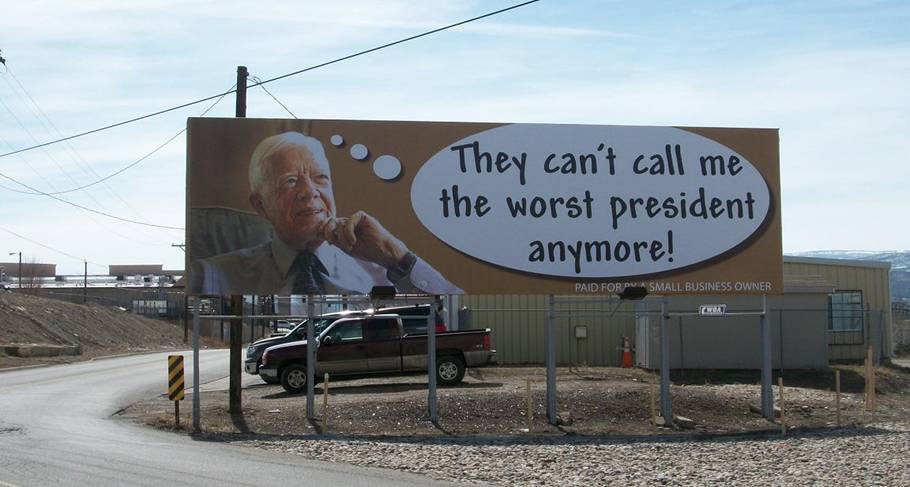In 1976, Jimmy Carter said the world would run out of oil by 2010, so we need to switch to coal.
Disrupting the Borg is expensive and time consuming!
Google Search
-
Recent Posts
- Net Zero In The UK
- Turn Out The Lights, The Party Is Over
- Michael Mann Again
- Over The Target
- Michael Mann’s Latest Research
- “an amazing documentary dismantling the climate change theory”
- The World’s Greatest Climate Scientist Speaks Out
- Startling New Revelation
- Just An Illusion
- Climate Conditioning
- Fact Checking Reuters
- No Correlation
- I Offended Their Religion
- The High Priest Has Forbidden Questioning His Religion
- Hiding And Rewriting History
- Fact-Free Economist
- Academic Tipping Points
- Desperate Academics
- Climate Misinformation
- Unreliable And Toxic
- Unreliable And Toxic
- Fossil Fuels To End Risotto
- HG Wells “CHANGES IN THE WORLD’S CLIMATE” 1920
- SCIENCE : THE ICE AGE COMETH?
- Climate Misinformation
Recent Comments
- Gamecock on Turn Out The Lights, The Party Is Over
- Russell Cook on Turn Out The Lights, The Party Is Over
- Rud Istvan on Turn Out The Lights, The Party Is Over
- oeman50 on Turn Out The Lights, The Party Is Over
- arn on Turn Out The Lights, The Party Is Over
- arn on “an amazing documentary dismantling the climate change theory”
- Francis Barnett on Turn Out The Lights, The Party Is Over
- jb on Turn Out The Lights, The Party Is Over
- Mac on Turn Out The Lights, The Party Is Over
- Richard E Fritz on Turn Out The Lights, The Party Is Over




I remember that. I was at the Colorado School of Mines then and we had some very generous govt grants to study coal gasification and coal slurry pipelines. We did the studies and they are still in the library over there in Golden where the West remains.
They built a gasification plant north of Beulah, ND. I don’t know if they ever built any more anywhere else though.
On pure recollection, I believe a test plantg was built at Fort Lewis, Washington, but I could be all wet.
A couple paper mills I worked with were also looking at tapping into future coal slurry pipelines to fuel steam and power generation.
I remember freaking out as a kid thinking I’d never be able to drive a car or a boat when I grew up because we were running out of resources. Glad I grew up.
I remember reading in my weekly reader in elementary school in about 1950 that we had only 10 years of oil left in the world.
History of ‘Peak Oil’
• 1857 — Romania produces 2,000 barrels of oil, marking the beginning of the modern oil industry.
• 1859, Aug. 25 — Edwin L. Drake strikes oil in Titusville, Pennsylvania
• 1862 — First commercial oil production in Canada, also 1863 in Russia.
• 1862 — Most widely used lamp fuel (camphene) taxed in US at aprox. $1 a gallon; kerosene taxed at 10 cent per gallon.(Kovarik, 1997)
• 1863 — John D. Rockefeller starts the Excelsior Refinery in Cleveland, Ohio.
• 1879 — US Geological Survey formed in part because of fear of oil shortages.
• 1882 — Institute of Mining Engineers estimates 95 million barrels of oil remain.With 25 million barrels per year output, “Some day the cheque will come back indorsed no funds, and we are approaching that day very fast,” Samuel Wrigley says. (Pratt, p. 124).
• 1901 — Spindletop gusher in Texas floods US oil market.
• 1906 — Fears of an oil shortage are confirmed by the U.S. Geological Survey (USGS). Representatives of the Detroit Board of Commerce attended hearings in Washington and told a Senate hearing that car manufacturers worried “not so much [about] cost as … supply.”
• 1919, Scientific American notes that the auto industry could no longer ignore the fact that only 20 years worth of U.S. oil was left. “The burden falls upon the engine. It must adapt itself to less volatile fuel, and it must be made to burn the fuel with less waste…. Automotive engineers must turn their thoughts away from questions of speed and weight… and comfort and endurance, to avert what … will turn out to be a calamity, seriously disorganizing an indispensable system of transportation.”
• 1920 — David White, chief geologist of USGS, estimates total oil remaining in the US at 6.7 billion barrels. “In making this estimate, which included both proved reserves and resources still remaining to be discovered, White conceded that it might well be in error by as much as 25 percent.” (Pratt, p. 125. Emphasis added).
• 1925 — US Commerce Dept. says that while U.S. oil production doubled between 1914 and 1921, it did not kept pace with fuel demand as the number of cars increased.
• 1928 — US analyst Ludwell Denny in his book “We Fight for Oil” noted the domestic oil shortage and says international diplomacy had failed to secure any reliable foreign sources of oil for the United States. Fear of oil shortages would become the most important factor in international relations, even so great as to force the U.S. into war with Great Britain to secure access to oil in the Persian Gulf region, Denny said.
• 1926 — Federal Oil Conservation Board estimates 4.5 billion barrels remain.
• 1930 — Some 25 million American cars are on the road, up from 3 million in 1918.
• 1932 — Federal Oil Conservation Board estimates 10 billion barrels of oil remain.
• 1944 — Petroleum Administrator for War estimates 20 billion barrels of oil remain.
• 1950 — American Petroleum Institute says world oil reserves are at 100 billion barrels. (See Jean Laherre, Forecast of oil and gas supply)
• 1956 — M.King Hubbard predicts peak in US oil production by 1970.
• 1966 – 1977 — 19 billion barrels added to US reserves, most of which was from fields discovered before 1966. (As M.A. Adelman notes: “These fields were no gift of nature. They were a growth of knowledge, paid for by heavy investment.”)
• 1973 — Oil price spike; supply restrictions due to Middle Eastern politics.
• 1978 — Petroleos de Venezuela announces estimated unconventional oil reserve figure for Orinoco heavy oil belt at between three and four trillion barrels. (More recent public estimates are in the one trillion range).
• 1979 — Oil price spike; supply restrictions due to Middle Eastern politics.
• 1980 — Remaining proven oil reserves put at 648 billion barrels
• 1993 — Remaining proven oil reserves put at 999 billion barrels
• 2000 — Remaining proven oil reserves put at 1016 billion barrels.
• 2005 — Oil price spike; supply restrictions and heavy new demand
• 2008 — Oil price spike; supply restrictions and heavy new demand, global economies collapse when oil reaches over $140 USD/bbl.
Oil reserves have declined from 95 million barrels in 1882, to well over a trillion barrels in 2011. We will probably run out in a few centuries at the rate we are consuming the oil. A simple solution for high efficient vehicles is already available – as soon as someone figures out how to install air conditioning and all wheel drive on a motorcycle…. No, it is not an error in numbers or statement – just a little sarcasm.
http://www.radford.edu/~wkovarik/oil/5oilreservehistory.html
Gator your link is “forbidden”
“Forbidden
You don’t have permission to access /~wkovarik/oil/5oilreservehistory.html on this server.
Apache/2.2.15 (Red Hat) Server at http://www.radford.edu Port 80″
Try this then…
http://www.environmentalhistory.org/billkovarik/about-bk/research/oil-fallacy1/oil-5/
Thanks! That one worked.
@larry brown
I remember reading in my weekly reader in elementary school in about 1950 that we had only 10 years of oil left in the world.
Perhaps we DID. Perhaps in 1950 we had enough oil to take us to 1960. However, by 1960, we had enough oil to take us to 1980. And by 1980, we had…
What environmental activists try to ignore is Julian Simon’s precept – that things are always changing and getting better. They like to pick a year and then assume that nothing will change – and, of course, the whole history of the world shows that that NEVER happens….
LOL https://www.youtube.com/watch?v=-tPePpMxJaA
Everything is a zero sum game to the left. The history of human innovation means nothing. In fact no history of anything that will not support their current agenda means anything. And if any history is in conflict with their current claims then they seek to distort and revise it if they just can’t ignore it.
I remember in 1979 moving into an appartment with thermostat set at 79, per orders of Jimmy Carter. With no air movement and DC’ summer humidity, it was highly uncomfortable. My solution, put lamp under the thermostat. Never suffered again.
After I got out of the Army I never lived anywhere again where someone else controls the thermostat in the dwelling. Just changed my thermostat at the house here. The programmable piece of crap just would not work properly. So a good old fashioned plain Jane Honeywell thermostat is installed now and does the trick. Btu if I want total control I’ll have to cut my wife’s fingers off.